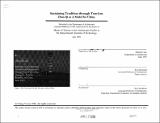Sustaining tradition through tourism : Zhan-Qi as a model for China
Author(s)
Lin, Ching-Yi, 1964-
DownloadFull printable version (18.60Mb)
Advisor
Roy Strickland.
Terms of use
Metadata
Show full item recordAbstract
Tourism is one of the biggest industries in the world and is expected to become the world's largest in the next century, providing major income for some countries. 1 However, for many countries, tourism comes at a high cost. Not only does it affect the Gross National Product, but it also has major social, cultural and physical impacts. For many countries, the dilemma between cultural preservation and tourism is an unsolved problem. To China, tourism means new j obs and Income. Therefore, developing tourist attractions has become one of the country's major goals. As in other countries, tourism may be very beneficial in terms of providing increased exchange values, currency and living standards, but it also carries the risk of turning culture into a commodity. By developing programming and design guidelines for the village of Zhan-Qi in China, this thesis will provide an example of well-balanced tourist development for both the Huang-Shan region, where Zhan-Qi is located, and for Chinese villages in general. Zhan-Qi is part of the Huang-shan region (or Hwe district), a region that now faces tourism's impact. It shares with Huang-Shan's other villages a fame for craftsmanship, business, and cultural achievement. Similar to Amish villages In America, these communities share a strong link to the land, minimal upward social mobility, a strong sense of heritage, and an emphasis on collective life. At the same time, they are confronting changes In their agricultural economy and the advent of tourism. This thesis will develop programming and design guidelines that will help guide Zhan-Qi's future development. These guidelines will be directed toward preserving and maintaining the essential character of Zhan-Qi, even as it depends increasingly on tourism for its economic future. Through 1) the analysis of Zhan-Qi, 2) case studies of well-balance tourist development in villages around the world, 3) the testing of resulting programming, and 4) the provision of guidelines with proposals for architectural interventions in Zhan-Qi, this thesis will provide guidance for Zhan-Qi cultural and economic sustainability and that of other villages in the Huang-Shan region and in all China.
Description
Thesis (M.S.)--Massachusetts Institute of Technology, Dept. of Architecture, 1998. Includes bibliographical references (leaves 95-96).
Date issued
1998Department
Massachusetts Institute of Technology. Department of ArchitecturePublisher
Massachusetts Institute of Technology
Keywords
Architecture